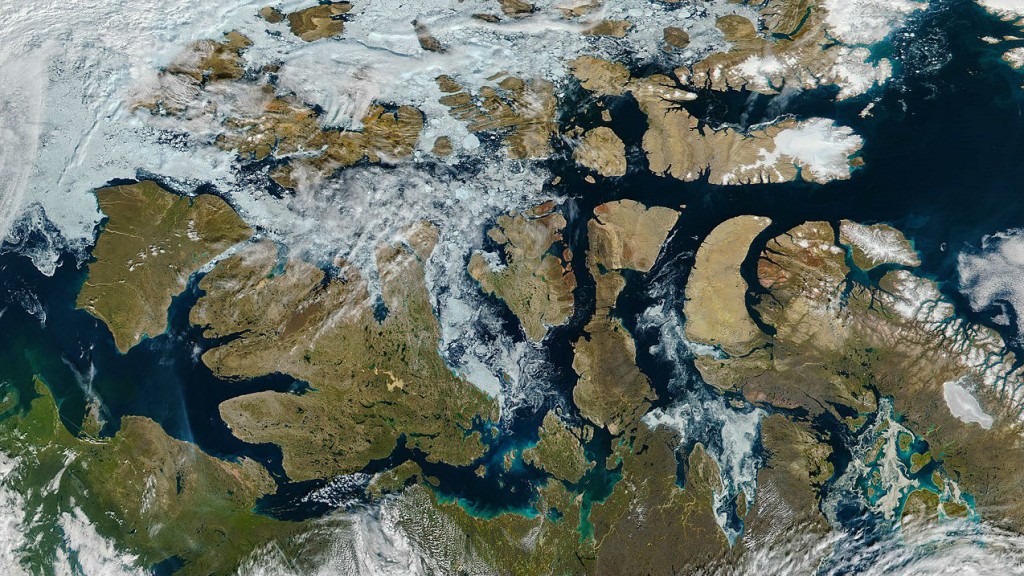It’s like a pizza oven out there. Extreme heat and humidity, which is thankfully expected to break tomorrow. Hard to find anyone who doubts global warming.
Washington, of course, still pretends it isn’t happening. But it has aggressively renewed its assertions that the Northwest Passage is not Canadian territorial waters. Global warming means the ice-bound passage is opening up, and will soon become economically significant. Canada’s claim to sovereignty over the channel through its arctic archipelago will eventually become the main source of conflict between the United States and Canada. [see my article from last year on the related Hans Island controversy].
So I’m pleased that the CBC National News is being broadcast, this week, from an ice-breaker going through the Passage. It will draw some public attention to this issue.
At the moment, we have very little to effectively assert Canadian sovereignty in the arctic archipelago, which is all in the sparsely inhabited territory of Nunavut. Militarily, we have nothing but CFS Alert, at the northern tip of Ellesmere Island, and a militia of Inuit reservists who are armed with WWI vintage rifles! Alert had only five permanent inhabitants in the 2001 census (though it qualified as the world’s northernmost settlement). Alert is actually closer to Moscow than it is to Ottawa, so it is not surprising that it had over two hundred personnel stationed there at the height of the Cold War. Nowadays, however, only about 75 people man the military signals intelligence radio receiving facility, and a few more man the Environment Canada weather station and the Global Atmosphere Watch monitoring facility. The environment is not many people’s idea of a holiday destination. From mid-October through the end of February the sun does not rise above the horizon and there is 24-hour darkness from the end of October until mid-February. The capital town of Nunavut, Iqualuit, is 2,100 km to the south.
Ellesmere is a huge island with a maze of colossal, rugged mountains and glaciers. In 1991, when a CC130 Hercules transport crashed only 18 km (10 miles) away from the base, it took 32 hours for a rescue team to reach the survivors overland. Yes, the terrain is that bad. There is another research station, not always manned, at Eureka, and a small Inuit settlement, Grise Fjord, on an island near the southern tip of Ellesmere. On Devon Island, there is the Haugton-MARS research station which studies the 20km-wide Haughton meteor impact crater and takes advantage of the harsh environment for various experiments by SETI and the Mars Society, and such oddities as the Arthur Clarke Mars Greenhouse. There are only ten people who are there for any length of time, and a handful of Inuit high school students who are hired to keep them from killing themselves. However, this is on the wrong side of the island to monitor the Passage. There was once a plan to create a settlement on Ellef Rignes Island, near the North Magnetic Pole, but the plan was abandoned, and there is nothing there now but a robotic unit.
The only inhabited place along the Passage is Resolute [Qausuittuq (pop.215)]. It is well placed, at the narrowest point in the passage, and roughly in the middle. But there is absolutely nothing at either the western or eastern entrances to the passage.
We are entirely dependent on satellite observation to monitor traffic through the passage, and that is useless for submarines. The U.S. has made a point of thumbing it’s nose at the Canadian government, by running subs through without asking permission. The Russians have also poked around secretly. As the arctic ice pack melts, marine technology advances, oil prices rise, and the passage becomes more viable, there will be increasing pressure from Washington and other world powers.
The present administration has promised to beef up the Inuit militia, and to position a training centre for it in Resolute, but this is hardly adequate. We need to build monitoring facilities at both ends of the passage, and to establish a much greater military and scientific presence in the entire 1.9 million square km of Nunavut.
We are presently bogged down in an expensive operation in Afghanistan, which has become more and more under the thumb of the U.S. military, and has ceased to have anything to do either with hunting down Al Kaida, or establishing viable civil society in that county. I am fairly convinced that George W. Bush has been committed, from the very start, to sabotaging any serious effort to revenge 9/11 or catch Bin Laden. Since helping the Afghan people, and hunting down Bin Laden were the reasons that Canadians supported (overwhelmingly) our presence there, I think it time we said “shit, or get off the pot” to Washington. Our military resources would be better employed defending our North than running around in a disastrous, American-managed guerilla war among tribal drug lords.

0 Comments.